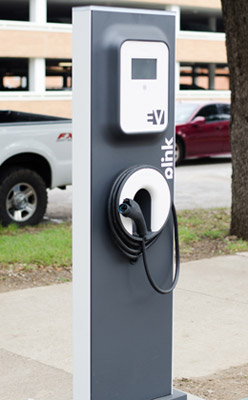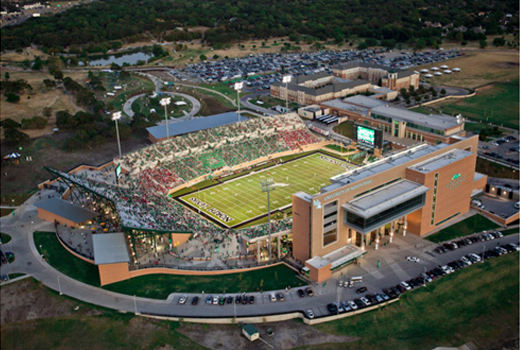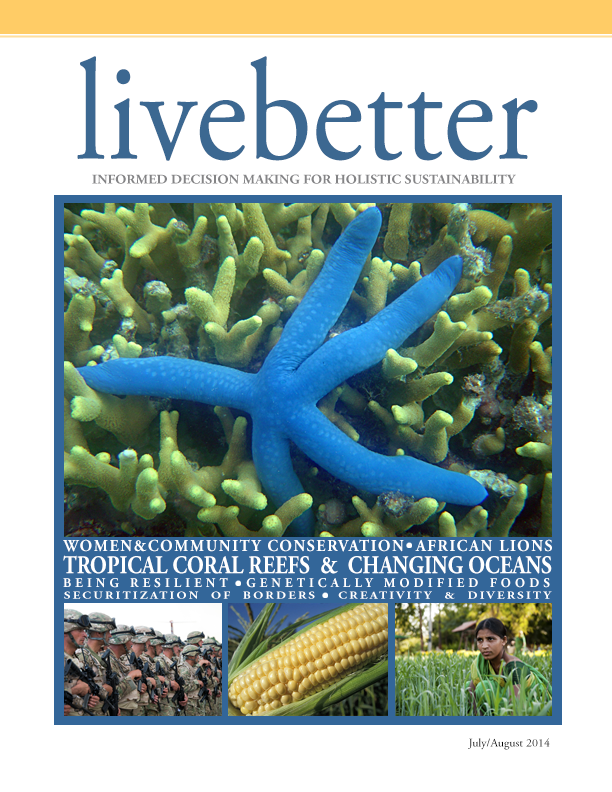We Mean Green: One University’s Sustainability Initiatives
The University of North Texas (UNT) continues its leadership in sustainability with its We Mean Green Fund (WMGF) – a $5 per student per semester fee, which funds environmental projects on campus. Approved by a student majority vote via a special election during Earth Week 2010, the fund supports projects that can be proposed by any university student, faculty or staff member. Currently, a student majority-led subcommittee of the Sustainability Council serves as the decision-making body for the funds distribution. The recent installation of six electric vehicle (EV) charging stations located in high traffic areas throughout UNT’s Denton, Texas, campus is the largest project funded by WMGF to date. Available for university faculty, staff and students, as well as off-campus users, the stations operate via Blink, the manufacturer’s network.
Prior to installing the stations, UNT’s Office of Sustainability conducted a broad transportation survey, which concluded that 37 percent of commuters would be influenced in their decision to purchase an electric vehicle if charging stations existed on campus. A project summary by UNT’s Office of Sustainability, released April 2012, explained that the objective of the project is to promote research and behavior change. The university’s installation of EV charging stations helps fulfill the mission of WMGF, which is to reduce campus carbon emissions and to promote campus sustainability through innovative, collaborative projects.
In addition to EV charging station projects, WMGF has approved a recycling bin effort that funded placement of 50 large recycling bins across campus, as well as a filtered water stations initiative, which increased the number of conveniently located refill stations. The goal of the latter is to raise awareness by students, faculty and staff that refilling a water bottle is more responsible than throwing away countless disposable plastic ones. Two new projects – a Rainwater Harvesting System and Natural Dye Garden – were also recently approved by the WMG Fund.

Image Courtesy of University of North Texas
|UNT Electirc Vehicle Charging Station
The idea for EV charging stations was proposed and submitted by UNT student Matthew McCallum and staff member Brad Holt, senior videographer in UNT’s division of University Relations, Communications and Marketing.
“I’d been planning to buy an electric vehicle as my next car, but I was waiting for the technology and infrastructure to grow a bit more,” said Holt. “As the Senior Videographer here at UNT, I’ve grown familiar with many different aspects of the university, including several of our green efforts. After submitting my ideas for EV support, I was thrilled to learn that a UNT student shared the same feelings I do about the subject. Matthew and I met several times to work out the details of how something like this might actually work logistically.”
In addition to funding provided by WMGF, ECOtality, the EV station manufacturer, will provide partial funding through a Department of Energy grant. ECOtality Inc., created in 1989 and headquartered in San Francisco, develops and commercializes environmentally friendly energy systems and solutions that address today’s global energy challenge. They strive to accelerate acceptance of clean technologies to replace carbon-based fuels.
Recently, the City of Denton noticed the construction of UNT charging stations and implemented plans for two stations to be built at a local natural food store. As a result, eight total Blink stations will be installed and functioning in Denton, with more than 250 operational in the Dallas-Fort Worth area.
UNT has long been a leader in sustainability efforts. In addition to installation of the six EV charging stations, the university received a $2 million grant from the State Energy Conservation Office to purchase and install three wind turbines at its Apogee Stadium. The turbines feed the electric grid, providing power to the stadium and other buildings on the west side of Interstate 35E.
“The effort by the UNT System staff and university to meet Department of Energy and State Energy Conservation Office requirements to win the grant for these new turbines underscores our commitment to creating a carbon-neutral campus,” said V. Lane Rawlins, UNT president. “Our university has a 75-year legacy of environmental research and sustainability, and we’re proud to be the first university in Texas to install wind turbines on campus.”
UNT’s sustainability projects have not gone unnoticed. In October 2011, the United States Green Building Council (USGBC) awarded Apogee Stadium LEED Platinum Certification, thus making it the first newly constructed collegiate football stadium in the nation to achieve the highest level of LEED certification. Other UNT buildings that have received LEED certification include the Business Leadership Building and Life Science Complex.
“This is a great accomplishment for UNT, and it strongly underscores our commitment to sustainability,” said Rawlins. “UNT is a leader in environmental research and sustainability, and the fact that we have the first LEED Platinum football stadium is an example of our commitment and our plans for the future.”
Some of Apogee Stadium’s sustainable design highlights include:
- More than 50 percent of the stadium site is preserved or restored with landscaping native to the North Texas climate;
- The high-performance stadium design uses energy-efficient heating, ventilation and air conditioning, and lighting equipment to reduce energy consumption by 25 percent;
- Low-flow plumbing fixtures, such as sinks, toilets, urinals and showers, reduce water consumption by more than 52 percent;
- Seventy-five percent of construction waste materials were recycled by the stadium’s contractor, preventing that waste from being sent to the local landfill;
- Of the products and materials used in the construction of the stadium, 20 percent were made with recycled content and more than 47 percent were manufactured locally;
- To further reduce CO2 emissions, higher percentages of fly ash were integrated into the concrete composition of the structure.

© iStockphoto.com/ChrisSteer
Other evidence of UNT’s dedication to a holistic approach to sustainability across campus includes:
- UNT offers graduate degrees in environmental science, mechanical & energy engineering, international sustainable tourism, an MBA in sustainability and the country’s first doctoral degree program in environmental ethics;
- UNT recycled more than 600 tons of materials last year and diverted more than 30,000 cubic feet of waste from the landfill;
- UNT monitors campus electrical consumption and water usage through the UNT SMART program;
- Forty percent of the energy on campus is derived from renewable sources provided by Denton’s municipal electric company;
- Forty-three percent of campus buildings have undergone energy-related retrofits;
- Twenty-five percent of the university’s food expenditures are on local or organic food sources;
- Twenty-five percent of the school grounds are maintained organically.
In May 2011, UNT was named to the “Green College” list of environmentally responsible universities by The Princeton Review, making it one of only three universities in Texas to make the list. In November 2012, UNT was named “Best University” in the North Texas Commission’s “Working for Clean Air Awards” competition. In addition, the university retrofitted 36 elliptical machines in its Pohl Recreation Center with ReRev technology to capture kinetic energy and produce electricity. The university also emphasizes water quality, renewable energy and conservation, renewable bio-products and bio-cultural conservation research.
UNT has been ahead of the curve when it comes to research, education, policies and the built environment. It continues to strive to ensure a holistic approach for the most sustainable future for its students, the North Texas region and global community. In other words, UNT means green!





























